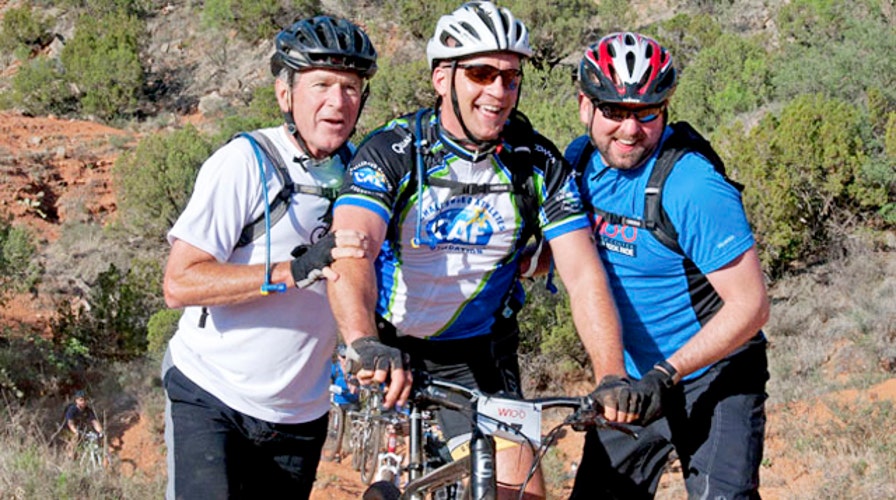President George W. Bush hosts 5th annual W100K bike ride
Dr. Siegel reports from first day of event with wounded warriors
Up ahead the mountain bikes cross the trail in perfect military alignment, their tires lining up as one, until a warrior falls. And then a swarm of hands reaches down to help.
It is the fifth annual W100K Warrior Mountain Bike Ride on President George W. Bush's Prairie Chapel Ranch in Crawford, Texas. The former president and commander in chief still leads by example. He is at the front of the pack, setting the standard for negotiating the turns and climbs.
Out of over 2 million men and women who fought in Afghanistan and Iraq, one in five suffers from PTS. And yet, as retired Army sergeant and medic Leslie Zimmerman said to me, sufferers don't feel they deserve to be called wounded, because their wounds aren't apparent.
The theme this year is the invisible wounds of war – post traumatic stress and traumatic brain injury. Out of over 2 million men and women who fought in Afghanistan and Iraq, one in five suffers from PTS. And yet, as retired Army sergeant and medic Leslie Zimmerman said to me, sufferers don't feel they deserve to be called wounded, because their wounds aren't apparent.
Out of over 2 million men and women who fought in Afghanistan and Iraq, one in five suffers from PTS. And yet, as retired Army sergeant and medic Leslie Zimmerman said to me, sufferers don't feel they deserve to be called wounded, because their wounds aren't apparent.
Exercise and sports are recognized therapies for these conditions, and the ride with President Bush helps Leslie and others valídate their invisible wounds and heal. By no longer considering PTS a disorder, the Bush Center Military Service Initiative and veterans' foundations around the country open a dialogue that leads to more comprehensive therapeutics and healing.
"We're here riding with people who got hurt, they're injured, and yet they refuse to allow their injury to consign them to a dull, meaningless life," President Bush says. "Some of the people we ride with have come back home with an injury that's treatable, but an injury that makes it really hard for them to see a positive moment and help. Not only we, but a lot of programs in the country, are dedicated to helping these warriors become the productive citizens we know they can be."
Research is ongoing at the Cohen Veterans Center at New York University and other places. In the meantime, warriors at the W100K bike ride who suffer from PTS and TBI learn to cope by never giving up, and by channeling their energies in a more positive direction.
Sgt. Maj. Brian Flom has served in the Army for 24 years. He was wounded in the face and throat in Iraq in 2007, but rather than give up, he returned to his unit. "PTS is not a disorder,” he says. “It's part of me. It's what shapes me. It makes me who I am today….
“I can let it handicap me and make it a disorder if I choose to, or I can come out and get outside and do events like this, and I live with it and I learn to cope with it every day."
The wounds are deep, even if they cannot be seen. But like all wounds, they can heal.

